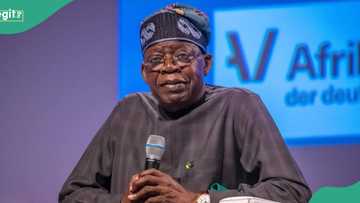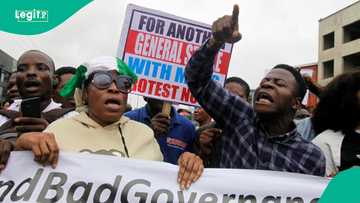Nigeria at 64: 5 Key Achievements of Tinubu’s Government
- Bola Ahmed Tinubu won the 2023 presidential election amidst allegations of electoral irregularities and vote buying
- Following his inauguration, Tinubu's government faced backlash for removing the fuel subsidy, leading to soaring inflation, among other challenges
- Despite these challenges, Tinubu's administration introduced key reforms aimed at long-term benefits
As Nigeria approaches its 64th Independence Day, the country reflects on the journey of its democracy and the achievements under President Bola Ahmed Tinubu’s administration.
While Tinubu’s election victory was met with controversy economic hardship has gripped many Nigerians.

Source: UGC
Bola Ahmed Tinubu, a former governor of Lagos State, emerged victorious in the 2023 presidential elections after a heated and contested race.
He ran under the All Progressives Congress (APC) banner, winning against top contenders from opposition parties such as the Peoples Democratic Party (PDP), and the Labour Party (LP).
His victory, however, was met with a barrage of allegations ranging from electoral irregularities to vote buying. Despite the challenges, the courts upheld Tinubu's presidency, cementing his position as Nigeria's 16th president.
Following Tinubu’s inauguration, Nigerians were hit by severe economic hardships.
The removal of the fuel subsidy, rising inflation, and a weakened naira contributed to public unrest.
Transportation costs soared, basic commodities became increasingly unaffordable, and many Nigerians struggled to make ends meet.
Despite these challenges, his government has enacted key reforms to position the nation for a brighter future.
5 key achievements of Tinubu's government
1. Local Government Autonomy
One of Tinubu’s significant moves has been his push for local government autonomy, a long-standing issue that has hindered development in rural areas.

Read also
"You can't give what you don't have": PDP chieftain slams Tinubu, drums support for Oct 1 protest
The administration sought a Supreme Court ruling to implement local government autonomy, a step that could empower grassroots governance and enhance socio-economic development across Nigeria.
As reported by The Punch, the Minister of Information, Idris Mohammed, highlighted this during a recent briefing:
“The President has taken the bold step of pushing for local government autonomy, a move that signals a major shift in Nigeria’s governance structure.”
2. Petroleum subsidy removal and Transition to (CNG)
Tinubu’s administration made the bold decision to remove the long-standing petroleum subsidy.
While this led to an initial spike in fuel prices, the government has been actively promoting the transition to CNG-powered transportation.
The Presidential CNG Initiative saw the launch of 30 hybrid CNG buses and the retrofitting of trains, promising to reduce travel costs significantly.
Akume, Minister of Special Duties, noted:
“The CNG initiative will revolutionize Nigeria’s transportation system, cutting costs and attracting investments in the energy sector.”
3. Tax reforms and foreign exchange stabilization
To stabilize Nigeria’s economy, Tinubu's government introduced tax reforms aimed at boosting government revenue and stabilizing the foreign exchange regime.
These reforms target macroeconomic stability and have begun attracting foreign investments, particularly in sectors like technology and agriculture.
4. Eduction: Nigerian Education Loan Fund
Tinubu signed the Student Loans Act into law, establishing the Nigerian Education Loan Fund.
The program was to make tertiary education more accessible to young Nigerians.
Over 22,000 students have benefited from the N2.5 billion disbursed so far, providing relief to families and improving educational opportunities for indigent students.
As reported by the New Telegraph, Minister Idris affirmed:
“The Nigerian Students Loan Fund is a landmark achievement that will ensure education is accessible to all, regardless of their financial situation.”
5. Enhanced security and counter-insurgency measures
In the face of continued insecurity in Nigeria, Tinubu’s administration has made strides in bolstering the armed forces and other security agencies.
By increasing institutional capacity and providing better equipment, the government has successfully neutralized insurgents, with many bandits surrendering for deradicalization.
Minister Akume emphasized:
“Our security forces have achieved great progress in tackling banditry and insurgency, ensuring a safer Nigeria for all.”
"No hardship": Yoruba Council kicks against looming Oct 1 protest
In another development, Legit.ng reported that as Nigeria approaches its Independence Day on October 1, the Yoruba Council Worldwide has raised concerns over the upcoming #Fearless protest.
The council, led by its President, Hassan Dotun, while speaking with Legit.ng on Saturday, September 28, emphasized that claims of current hardship may misrepresent the ongoing challenges faced by citizens.
PAY ATTENTION: Сheck out news that is picked exactly for YOU ➡️ find the “Recommended for you” block on the home page and enjoy!
Source: Legit.ng





